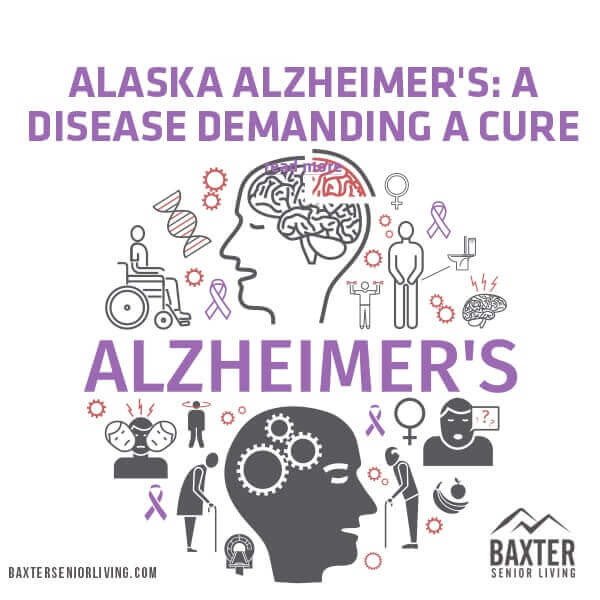“I don’t know who you are. And I want you out of my room and to leave me alone. Or I’m going to call for help!”
These and similar responses are commonly heard in homes and assisted living communities across Alaska. They are harsh words and usually spoken by an aging parent to frustrated children, familiar friends, and even a loving spouse. An agitated parent has little awareness of his condition and can seldom recall recent events. He is a victim of short- and long-term memory loss and is experiencing a gradual decline in mood, thinking, and social and language skills. But unfortunately, he is not alone. Millions more like him in every corner of the globe suffer from what was once considered a rare form of dementia: Alzheimer’s disease.
Attacking and destroying neurons, or the brain’s nerve cells, Alzheimer’s disease is a progressive, degenerative condition resulting in gradual then permanent memory loss and a host of other debilitating behavioral changes. These neurons create a neurotransmitter (brain chemical) called acetylcholine, which produces a “disconnect” with other nerve cells when destroyed. Over time, thousands among thousands of nerve cells die, finally leading to the last phase.
As part of the National Institute on Aging in the United States, the National Alzheimer Coordinating Center has funded PET studies at the University of Michigan and elsewhere. PET is a significant breakthrough for helping Alzheimer’s disease because, in the past, it was near impossible to diagnose it from other illnesses which imitate its symptoms. Only after death could an autopsy confirm the presence of the disease. “One of the challenges of diagnosing Alzheimer’s disease is that it doesn’t cause big changes that are visible on MRI and CT scans,” says Norman Foster, M.D., the neurologist guiding the research team at Michigan University. So PET can reveal Alzheimer’s disease from other disorders and help determine how a person should be treated.
There are two main stages to the disease, although it can take years of progressive degeneration before a patient is entirely ravaged by Alzheimer’s. The illness first kills neurons in the brain’s hippocampus region when short-term memory begins to fail. Later, when nerve cells are destroyed in the brain’s cerebral cortex, judgment and language skills increasingly deteriorate until one becomes completely dysfunctional and physically disabled.
Despite all this and continued skepticism about its real cause, Alzheimer’s is not a normal part of growing old. Nor does it only manifest in seniors or older people. Some of Alzheimer’s apparent symptoms are:
- Feelings of stress and confusion in making decisions
- loss of interest in people and previously enjoyable activities
- Loss of appetite and other normal urges
- Feelings of anxiety, suspicion, and undue caution
- Repetition of actions and speech
- Loss of train of thought when talking or doing something
- Losing or misplacing things with increasing frequency
- Loss of memory of familiar places and how to get to them
- Forgetting people’s names, who familiar people are, dates and times, phone numbers, and other everyday things
- Increasing depressed, disoriented, and agitated
Still, Alzheimer’s is most common among older adults, as about one in ten develops it over the age of 65, and as many as five in ten people over the age of 85. Affecting about equally both males and females and all races, an estimated four million people suffer from the degenerative condition in the United States alone. And numbers are continuing to climb there and in other developing nations and third-world countries.
Though most agree Alzheimer’s cannot be prevented or cured, doctors know that if diagnosed and treated early, people with Alzheimer’s may be able to keep higher memory and thinking skills far longer. And also perform daily tasks and activities for more significant periods, enjoy longer-lasting relationships with family and friends, and remain in the community much longer. This may be sobering news and of little import to those who have end-stage Alzheimer’s. But it is a godsend to those recently diagnosed or who may be fearful of contracting the disease later in life.
Alaska Alzheimers Resource:
• Alzheimer’s Resource of Alaska Library
• Alzheimer’s and Dementia Facts and Figures
• Mini-Grants
• Alzheimer’s Blog
Baxter Senior Living is an Assisted Living Community located in Anchorage, Alaska. If you want more information, please get in touch with us today. (907) 865-3500 or complete our contact form, and we will be in touch!
Learn more about our services by visiting Anchorage memory care, or Anchorage assisted living on our website.

